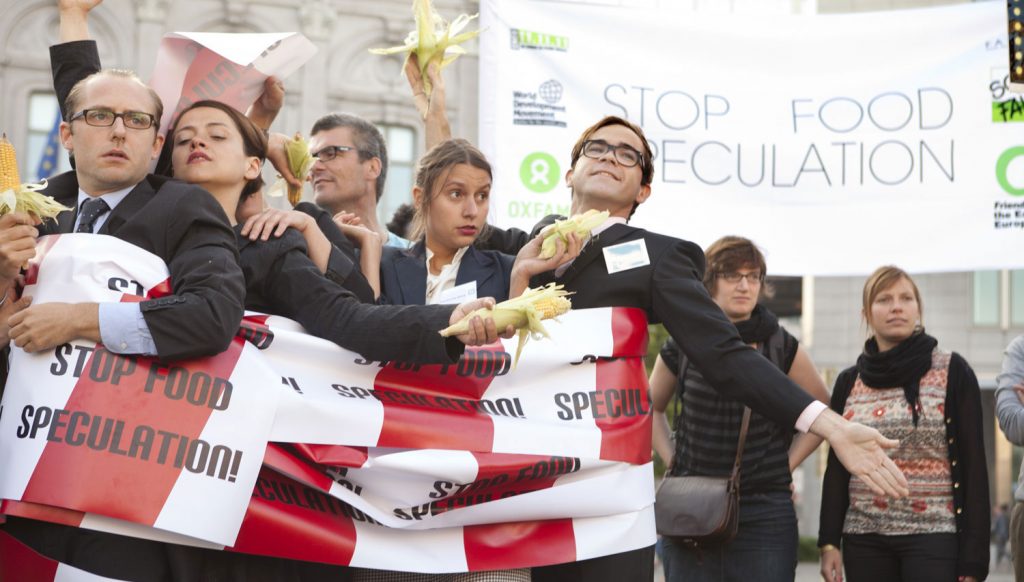Five years on from the bankruptcy of the Wall Street bank Lehman Brothers, Europe has done little to respond to the ensuing financial crisis, according to a statement from 40 civil society groups. Europe still lacks the solid regulation that could prevent another financial collapse, and the necessary measures to curb the influence of the financial lobby in Brussels.
The 15th of September marked the most spectacular bankruptcy of the 2007-2008 financial crisis – the renowned Wall Street investment bank Lehman Brothers filed for bankruptcy as a result of its disastrous investments in American real estate. At the time, European leaders, including Commission President Barroso, made bold promises to reform financial regulation in the European Union – to respond to the crisis and to avoid future reoccurrences.
The financial crisis led to a devastating economic crisis in Europe. Unemployment increased steadily to a record level of nearly 26 million – a staggering 10.7% of the labour force – with youth unemployment much higher. It also set the euro-crisis in motion, resulting in painful austerity measures in almost all EU countries, and bailouts of hundreds of billions of euros for the very banks that caused the crisis. Having paid such a high price, European citizens have every right to demand effective action from politicians to protect themselves from a repeat meltdown.
Anne van Schaik, accountable finance campaigner for Friends of the Earth Europe said: “Having paid such a high price in Europe’s economic crisis, European citizens have every right to feel short-changed. Europe urgently needs effective action from politicians to rein in the financial sector and prevent a repeat of the crisis.”
In the statement, signed by 40 civil society groups across Europe, European banks are accused of lending above their weight, and weak banking regulation is criticised for allowing banks – such as Deutsche Bank and Barclays – to borrow even more than Lehman Brothers did before it crashed. In addition, the signatories warn that derivatives markets continue to grow and now stand at a value much higher than five years ago. Few of the toxic financial instruments, including the complicated securities that played a key role in the crisis, have been banned.
This is largely due to the success of a well-funded financial lobby, who have kept effective regulation at bay, and as a result of uninterrupted privileged access to decision makers. The statement calls on European politicians to put the public interest before the profits of the financial industry, and live up to their promises.
To ensure genuine reform of the financial sector Europe needs to:
- curb the influence of the financial lobby in Brussels, by overhauling industry-dominated advisory groups and closing revolving doors between government and the finance industry
- ensure strong regulation and democratic control of the financial sector, so that it serves society and finances social and environmentally sound activities
- introduce a genuine Financial Transaction Tax
- break-up banks that are too big to fail and reduce the importance of the financial sector in the economy
- end destructive speculative practices such as food speculation
- stop tax evasion, which according to the Commissions own figures would bring hundreds of billions of euro a year, more than enough to cover current austerity measures
- introduce measures that hold those in the financial sector responsible for scandals, misleading of clients, fraud and criminal activities, personally liable. Banks and their employees should never be ‘too big to jail’.
The last five years of financial reform have short-changed the public and left Europe no more secure than it was in 2008 according to the statement. Regulating the financial sector is a political and public necessity – we should learn from the mistakes that led to the bitter economic crisis in Europe, not repeat them.
Read the full statement here, signed by the following organisations:
Action from Ireland, Friends of the Earth Flanders and Brussels, Friends of the Earth Ireland, Les Amis de la Terre, Corporate Europe Observatory, European Federation of Public Services Unions (EPSU), CNE-CSC (Belgium), Transnational Institute, War on Want (UK), Citizen Debt Audit Platform (Spain), FairFin (Belgium), Zukunftskonvent, Lost in Europe, Food & Water Europe, Tax Justice Network, transform!italia, European ATTAC Network, ATTAC-Finland, ATTAC Norway, ATTAC Portugal, ATTAC Poland, ATTAC Vlaanderen, ATTAC Spain, ATTAC France, ATTAC Austria, ATTAC Germany, ATTAC-Ireland, ATTAC Hellas, ATTAC Iceland, Kairos Europe, Ecologistas en Acción (Spain), Jubilee Debt Campaign (UK), World Economy, Ecology & Development – WEED (Germany), Both Ends (NL), CADTM Europe, World Development Movement (UK), Auditoria a Cidadada Divida Publica – IAC (Port.), Bank Track, Fondazione Culturale Responsabilità Etica (Italy), Veblen Institute for Economic Reforms (F), European Anti-Poverty Network







